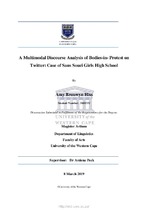| dc.description.abstract | The legacy of apartheid is one that has left traces of racial oppression and inequitable
distribution of state resources across the landscape of the country. Cape Town in particular is
a city of many contrasts with grand residential estates often tucked far away from decaying
townships and forgotten slums outside of the CBD. One particular domain that epitomizes the
continuing inequality between racial groups is that of education.
Even though South Africa officially achieved independence in 1994, little is known about
changes in the status quo at many formerly white schools. The all-girls high school of Sans
Souci Girls High School (SSGHS) in Cape Town recently came to light as a site of conflict
and tension with learners taking to Twitter to voice their anger towards what they deemed as
unfair and racialized practices at the school.
This thesis investigates the protest of young black learners at SSGHS, with particular focus on
the languages used, videos and images uploaded as well as the complementary and
contradictory online press releases. The study further explores the ways in which racialized
and gendered practices are resemiotized and (re)contextualised through the protest.
The use of online platforms such as Twitter and the emergence of protests at institutions across
South Africa has become a regular feature of South African media reports. Under the banner
of decolonizing education, many of these anti-establishment movements have become quite
effective in getting their voices heard, both locally and internationally. Of interest to this study
is whether and how the protest at Sans Souci fits into a larger paradigm of decolonizing
education and furthermore, what these protests contribute to a larger conversation regarding
gender, racial tensions and naturalised racialized discourses and practices at formerly white
schools. It is hoped that a multimodal discourse analysis of images, videos and comments
online will provide much-needed information about the semiotics of protest and
transformation at the school as they emerge on the internet. | en_US |

